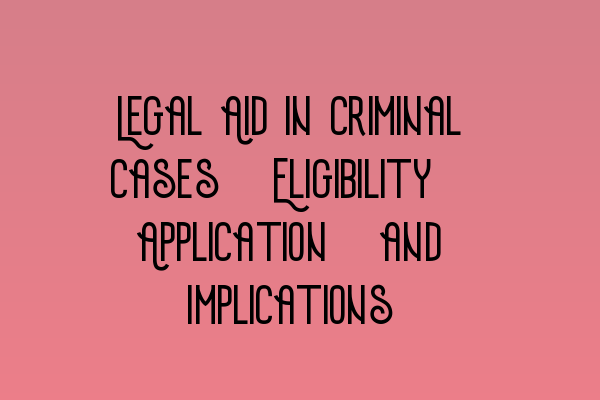Legal Aid in Criminal Cases: Eligibility, Application, and Implications
As legal professionals, it is crucial for us to understand the intricacies of legal aid and its role in criminal cases. Legal aid plays a significant part in ensuring access to justice for individuals who may not have the financial means to afford legal representation. In this article, we will explore the eligibility criteria for legal aid in criminal cases, the application process, and the implications it has for both lawyers and defendants.
Eligibility Criteria for Legal Aid
Applying for legal aid in a criminal case requires meeting certain eligibility criteria. These criteria are designed to assess an individual’s financial resources and the seriousness of the case. Eligibility is determined by various factors, including income, capital, and the type of legal representation required.
To qualify for legal aid, individuals must pass a means test. This test takes into consideration their income, including wages, benefits, and pensions, as well as their living expenses. The means test ensures that legal aid is provided to those who genuinely require financial assistance.
Additionally, individuals may also be subject to a merits test, which evaluates the merits of their case. The merits test considers factors such as the likelihood of success, the seriousness of the offense, and the potential penalty. This test ensures that legal aid is allocated to cases that have a reasonable chance of success.
It is important to note that legal aid is not automatically granted in all criminal cases. Certain offenses, such as minor non-imprisonable offenses, may not meet the eligibility criteria for legal aid. However, individuals still have the option to seek legal advice through other avenues, such as community legal clinics or pro bono services.
The Application Process
Applying for legal aid in criminal cases involves a thorough and comprehensive process. It is essential to understand the steps involved to ensure a smooth application.
Firstly, individuals must complete an application form, which can be obtained from their local legal aid office or downloaded from the Legal Aid Agency’s website. This application form requires detailed information regarding personal and financial circumstances, as well as details about the case.
Once the application form is completed, it must be submitted to the Legal Aid Agency. The agency will then evaluate the application based on the eligibility criteria, including the means and merits tests. It is crucial to provide accurate and complete information to avoid delays or potential complications in the assessment process.
If the application is approved, individuals will be issued a legal aid certificate. This certificate allows them access to legal representation provided by solicitors or barristers who are registered to undertake legal aid work. It is important to note that individuals have the right to choose their legal representative, as long as they are registered for legal aid.
Implications for Lawyers and Defendants
Legal aid has significant implications for both lawyers and defendants involved in criminal cases. For lawyers, taking on legal aid cases can provide valuable experience and exposure to a wide range of cases. It allows them to contribute to the principles of justice and assist individuals who may not have otherwise been able to afford legal representation.
For defendants, legal aid ensures that they receive adequate legal representation, regardless of their financial situation. This plays a crucial role in upholding their right to a fair trial and access to justice.
However, it is important to acknowledge the challenges faced by legal professionals operating within the legal aid system. Legal aid fees may not always reflect the actual time and effort put into a case, and lawyers may face constraints in terms of resources and funding. This can impact the quality and availability of legal representation in some instances.
Nonetheless, legal aid remains a vital component of the criminal justice system, providing a safety net for those who otherwise may not have access to legal support. It is essential for legal professionals to stay informed about the latest developments in legal aid and to ensure that their clients’ rights to legal representation are upheld.
To further expand your understanding of criminal practice, consider attending our workshops and seminars on criminal practice. These events provide valuable insights and opportunities for networking with other legal professionals. Check out our related article to learn more: Workshops and Seminars on Criminal Practice: Expanding Your Expertise.
Staying informed about updates in UK criminal laws is crucial for legal practitioners. It allows us to navigate and adapt to the ever-changing legal landscape. To learn more about staying informed and prepared, read our related article: Updates in UK Criminal Laws: Staying Informed and Prepared.
Enhancing your SQE criminal law study group experience can provide valuable insights and opportunities for collaborative learning. To learn more about enhancing your study group experience, check out our related article: Enhancing Your SQE Criminal Law Study Group Experience.
Understanding criminal evidence rules is essential for building a strong case. To delve into a detailed analysis of criminal evidence rules, read our related article: Decoding Criminal Evidence Rules: A Detailed Analysis.
Ensuring the rights of victims in criminal procedures is crucial for a fair and just legal system. To learn more about the legal protections and support available for victims, read our related article: Ensuring Rights of Victims in Criminal Procedures: Legal Protections and Support.
Legal aid in criminal cases plays a vital role in protecting the rights of individuals and ensuring access to justice. By understanding the eligibility criteria, application process, and implications, we can navigate the legal aid system effectively and uphold the principles of justice.
